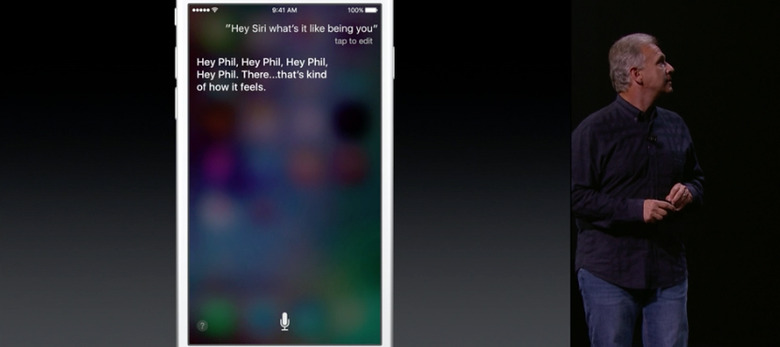iPhone 6s: Apple Didn't Explain The Huge Privacy Implications Of One Major New Feature
You don't even have to be an Apple product owner to know the company is keen on protecting the customer's privacy and security. So when Apple unveils a major new iPhone 6s feature on stage during its keynote without explaining the obvious privacy implications, you'd think there's no reason to worry, and that might be perfectly right.
But this doesn't change the fact that there are some serious unanswered questions surrounding the new iPhones' always-on "Hey Siri" feature.
MORE COVERAGE:
iPhone 6s: The 9 best new featuresiPhone 6s, iPad Pro and new Apple TV: The memory storyI realized yesterday that I love and hate Apple
Phil Schiller quickly showed off the feature by triggering a funny Siri reply on stage during the event, but the exec did not say what happens when Siri is set to listen at all times. What happens to that data and how is it collected? Is anything recorded? Is data transmitted anywhere?
To existing iPhone users, always-on Siri isn't new. The feature was there before but worked only when a phone was charging. But not all iPhone 6s buyers will be customers that are familiar with how such a feature would work, and what the privacy implications might be.
In a message about "Apple's commitment to your privacy," Tim Cook stressed the fact that Apple protects user data with strong encryption and that it doesn't share user data with advertisers. "iAd sticks to the same privacy policy that applies to every other Apple product. It doesn't get data from Health and HomeKit, Maps, Siri, iMessage, your call history, or any iCloud service like Contacts or Mail, and you can always just opt out altogether," he said.
But this isn't a complete response and still leaves the door open to questions surrounding surveillance. Also, s device listening to you at all times would also listen to others nearby, even though they're not the owners of the device.
As Business Insider notes, there are unanswered questions about always-on listening features that allow device manufacturers to gain easy access to a user's voice. Apple isn't the only one with such features, as Motorola, Google, Samsung, Amazon and others already have products that make use of similar technology.
Among them, Samsung found itself in hot water earlier this year for its always-listening Smart TVs and a rather shady privacy policy.
"It's impossible to know if you say the word unless it listens," Harvard Law fellow at the Berkman Center for Internet and Society Bruce Schneier told the news site. "What are they doing with the data they're hearing, and under what rules do they allow the government to listen in?"
It's very likely that Apple is taking significant measures to protect your data. And it's likely that Apple simply didn't have time to focus more on the feature's privacy implications during the event. But considering that always-on listening will probably be one of the central features of any computer in the following years, maybe Siri's listening powers should be clearly outlined on Apple's privacy page.
